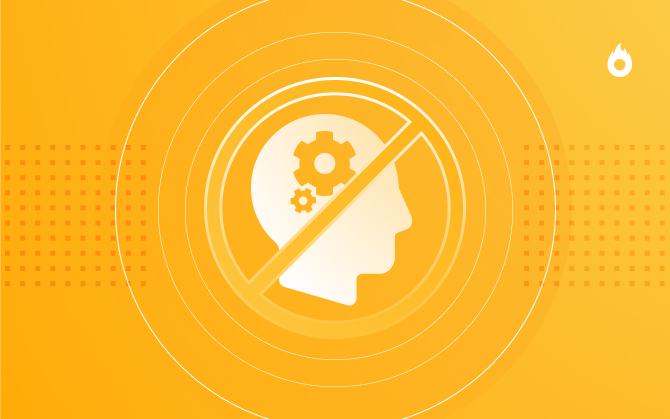
Limiting beliefs: How to avoid thoughts that prevent you from growing
Have you ever given up on trying something new because you assumed you wouldn’t be able to do it? This behavior is related to limiting beliefs.

What will we see in this post
Have you ever heard the saying, “If you really want to do something, you’ll find a way. If you don’t, you’ll find an excuse?”
Well, many times — and I do mean many times! —, we don’t go after something because of random justifications that prevent us from trying. But we’re not talking about laziness or lack of motivation, but of limiting beliefs.
This term is famous and refers to a series of “fanciful” ideas we have and that limit us in various ways.
Pessimistic thoughts usually prevent us from following our positive ambitions. But after all, what are limiting beliefs and how do we overcome them?
Read this text and find out!
What are limiting beliefs?
Even if you aren’t a very religious person, you are probably familiarized with the term “belief”: It means blindly believing in something.
Now, when we talk about a limiting belief, we’re talking about thoughts that are rooted in our mind, about which we have no doubts, but that limit and prevent our actions.
Do you want a classic example?
Well, who of us has never said something like, “That person would never be interested in me, and I shouldn’t even try to approach them.”
For some reason, — which comes from your upbringing, from your social experiences, or even from a misguided personal perception —, you believe that you aren’t interesting or attractive enough.
More than a problem of low self-esteem, we are facing a limiting belief. After all, it was this thought that prevented you from approaching the person in the first place. Now, let’s learn more about where these limiting ideas come from, shall we?
They can originate from childhood
The environment in which we grow up, especially in early childhood, has a huge power of molding our personality.
Upbringing, the influence of uncles and aunts, and even the presence of other children in our early childhood are determining factors for some of the concepts and behaviors we carry to adulthood.
Of all family members, parents have the strongest influence in this sense. They probably only wanted what’s best for you, but due to their own cultural and social hang-ups, they might have damaged your personality in some way. Criticisms, comments, overbearingness, excessive expectations, etc.
Sometimes, they originate from social interactions
The limiting beliefs that originate from social interactions are also quite common, even more than hereditary ones.
After all, after we are exposed to places with diversified interactions — school, church or a drama course, for example —, we begin to have contact with other worlds that go far beyond what we were introduced to at home.
Therefore, you might have contact with prejudice, competitive behavior and so on.
In addition, certain patterns are incorporated early on in our society, with the pursuit for certain body types, rejection because of hairstyles and the need to have popular social media accounts, just to mention a few examples.
Other times, they originate from within
Now, certain limiting thoughts don’t originate in our childhood, or from social interactions throughout life, but from within us.
How many times have you convinced yourself that you weren’t capable of doing something by giving a lame excuse, when in reality you were simply afraid? In this case, a self-evaluation is welcome.
Fear of failure, of trying new things, of opening up to new experiences, of being the object of mockery are quite common in human beings.
However, personal limiting beliefs are hard to be deconstructed and therefore, end up preventing us from reaching our true potential.
What are the most common limiting beliefs?
Just pay attention: Whenever someone proposes something interesting or when a great opportunity comes up in your life, do you usually refuse with some pessimistic phrase?
If you do, we have a limiting belief warning! Check out a few very common examples:
- I’m not good enough;
- This isn’t for me;
- I’m not capable of solving this problem;
- I’ve gotten bad grades in math and so, I’ll never be an engineer;
- I’ll never learn how to drive; after all, I have a terrible sense of direction;
- I should stay in this job instead of quitting and trying another one;
- I probably shouldn’t try this civil servant examination, the competition is too fierce;
- I’m incapable of sticking to a diet;
- It’s too late to try to change things.
Anyway, the list is huge. Basically, any thought that prevents you from even trying is a limiting belief.
As you can imagine, they have a negative effect on our lives, because they are responsible for placing barriers on our true potential, barriers which could probably be overcome with some effort.
How to identify and overcome these limiting beliefs
At this point in the text, you have probably realized that dealing with limiting beliefs is quite challenging, right?
This is because they become rooted, and when they are longstanding, they require a lot of effort to change our concepts. But we have a few tips!
Check out what will help you become free of these thoughts.
Be open to changes
The first and hardest step to becoming free of your limiting beliefs is being open to change. Not being afraid of the unknown and leaving your comfort zone is key in order to overcome your own limits.
So, try situations, social circles or goals that are completely different from everything to which you are conditioned.
Stay clear from the causes
Identifying the reasons that lead to limiting beliefs is also quite valid. If it’s because your parents are too strict and make you believe that you fail more than you succeed, how about moving away from home and get away from these references?
If it’s your life partner who makes you feel undeserving of happiness, you might want to have a serious and honest conversation and perhaps rethink that relationship.
Change your mindset
Finally, changing your mindset — in other words, your own thinking —, is also a good path to follow. Start believing more in yourself, in your skills and competence.
Often times, limiting beliefs end up leading to self-sabotage, when the attempt could easily lead to personal or professional success.
How about bidding farewell to your limiting beliefs?
As you’ve seen, overcoming your limiting beliefs is not impossible at all. Believing it is, would mean falling into this trap.
Whether they are hereditary, social or personal, they can be broken with changes in behavior, by identifying the causes and adjusting how you see the world and yourself. The result is that you’ll reach new achievements and have a better quality of life.
So, do you feel lighter?
Remembering that these tips are only one of the ways to help you. If you can’t get rid of your limiting beliefs, as the ones mentioned here, we advise you to seek help from a psychology professional. ❤
In order to follow other content for your professional and personal growth, stay tuned to our blog and leave us a comment if you need any help!




